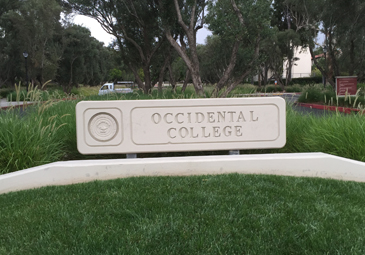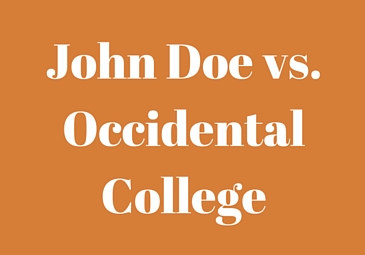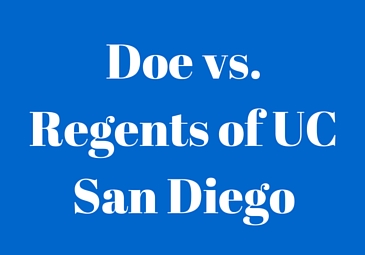When it comes to sexual activity on college campuses, only “yes” means “yes.”
“No” always means “no.”And sometimes, “yes” means “no.”
You can verbally say “yes” and seem to non-verbally communicate “yes,” but if you’re drunk, you cannot legally say “yes” to anything.
Affirmative consent is “conscious and voluntary agreement to engage in sexual activity,” according to California law.
But affirmative consent is not the issue here. The issue is the burden of proof now required for sexual misconduct Title IX cases under California’s Student safety: sexual assault act (SB-967), also known as yes means yes law.
The burden of proof requirement is now “a preponderance of the evidence” which means if something is found “more likely than not” to be true, it is considered as fact. That differs from the criminal court standard, which is “beyond a reasonable doubt.”
Under the “more likely than not” standard, it’s easier to “prove” that a person is drunk. When a person is “drunk” that means that person cannot legally consent to sexual activity. So if someone is accused of sexually assaulting that “drunk” person, the accused is automatically found “responsible” in a Title IX hearing, no matter what.
Some people say this discriminates against the accused.
College students accused of sexual assault have their fates at school decided by university officials on administrative panels that are designed to prevent discrimination on the basis of sex or gender. But this process in its current form, as now required by yes means yes law, may create the problem it’s trying to solve.
WHAT IS AFFIRMATIVE CONSENT?
“Affirmative consent” is the buzzword for the concept that the absence of a “no” does not constitute a “yes” when it comes to authorizing someone else to engage in sexual activity with you.
Affirmative or “pure” consent was first made policy on a college campus in 1991 at Antioch College near Columbus, Ohio.
California’s yes means yes law, signed into law by Gov. Jerry Brown in September 2014, mandates this policy be used statewide during determination of sexual assault claims by any college or university that accepts state funding, for example, for financial aid for its students.

Kristin Clark, Vice President of
Student Services at
Orange Coast College
in Costa Mesa,
California. (Photo
provided by Kristin Clark)
TITLE IX AND ADMINISTATIVE HEARINGS
Title IX is a federal law that states that you can’t be denied equal access to activities or be otherwise discriminated against in any way on the basis of sex. Educational institutions must comply with this law in order to receive federal funding.
The Department of Education’s Office for Civil Rights (OCR) oversees and enforces Title IX at college campuses and universities.
When most people hear “Title IX” they think of equal access to athletics for members of all sexes, said Kristin Clark, Title IX expert and Vice President of Student Services at Orange Coast College in Costa Mesa, California. Before April 2011, Title IX coordinators and investigators looked at sex-based discrimination primarily through that lens as well.
In April 2011, the Office for Civil Rights published a Dear Colleagues letter specifying that any kind of sexual misconduct or sexual harassment falls under Title IX protection against gender-based discrimination. “[That’s when] colleges and universities started to look at Title IX differently,” said Clark.
“The OCR issues Dear Colleagues letters pretty regularly,” said Kegan Allee, Interim Director and Title IX Coordinator at the University of Southern California. “[A] 2001 letter is widely understood to be the first letter that has to do with sexual misconduct and how sexual misconduct is considered a form of Title IX violation, [but] the 2011 letter created a huge impact in the higher education community.”
THE BURDEN OF PROOF UNDER CALIFORNIA’S YES MEANS YES LAW
OCR’s Dear Colleagues letters make recommendations that schools must effectively follow in order to continue to be eligible for federal funding. These letters don’t really have the force of law in and of themselves, but the withholding of federal funding if you don’t comply with recommendations is the mechanism they use for enforcement.
One recommendation that the April 2011 letter made was that universities change the burden of proof standard in their Title IX hearings on sexual misconduct to a preponderance of the evidence standard as opposed to other more difficult standards to meet, and that is what California took a step further and made statewide law with the passing of the yes means yes law in September 2014.
"In the criminal justice system, the standard of proof is beyond a reasonable doubt [to find someone guilty of a crime]," Clark said. "In Title IX investigations the Office for Civil Rights requires that we use a standard of proof that’s called the preponderance of the evidence."

Sandra Henriquez,
Executive Director of
CALCASA.
(Photo provided
by CALCASA)
Survivor advocacy groups generally support a preponderance of the evidence as the standard of proof for campus sexual assault cases. “[The campus process] is not the criminal justice process and those two should not be conflated,” said Sandra Henriquez, Executive Director of California Coalition Against Sexual Assault (CALCASA).
“In one instance we’re talking about somebody’s attendance at a university and their potential sanctions from that university, maybe suspension or expulsion, and so to me that merits a much lower standard of evidence than when we’re talking about the criminal justice system when we’re looking at somebody’s life, when we’re talking about that kind of freedom.”
PROVING THE CLAIMANT WAS DRUNK
Clark thinks the reason why yes means yes law was written is because there was an assumption that if somebody was silent or intoxicated that he or she was consenting to intercourse. “I think the law provides awareness for people [that that is not true].” But the law does more than provide awareness.
It’s well-settled law that if a person is intoxicated, they do not have the mental capacity necessary to consent to sexual activity. What is unique about the Title IX setting is that now, under yes means yes law, the claimant only has to prove that he or she was “more likely than not” to be intoxicated, and if that standard is met, the claimant is deemed to have been intoxicated at the time of the incident, and the respondent is automatically deemed responsible for sexual assault.
“Each case is handled on an individual basis, and the totality of the evidence is evaluated to determine if there is preponderance of information that the complainant was incapacitated at the time of the alleged misconduct,” Allee said. “Complainant statements along with witness statements, video footage, and other such factors are often considered in these determinations.”
“This is a really complicated law. I think that a lot of administrators in the system get the premise behind it and understand the rational for the law being implemented, but on the practical side of enforcing it, it’s very difficult for us,” Clark said.
“The people who are investigating these claims are trained in investigations for Title IX and they’re trained in the legislation for Title IX, but they’re not forensics people. They don’t have access to forensics, they don’t have access to background checks, they aren’t clinical psychologists, typically, who can assess people’s mental status, and so it can get to be very difficult for the Title IX administrators to really ascertain whether or not there was capacity [to consent].”
So what happens if two students are both intoxicated, both participate in sexual intercourse with each other, both wake up the next day wishing they hadn't done that and both file a Title IX claim for sexual assault?
HERE’S HOW SEVERAL COLLEGE STUDENTS IN LOS ANGELES COUNTY ANSWERED THAT QUESTION
As reported by Yahoo! News, during trial testimony in an expelled student’s May 2014 lawsuit against Duke University, Duke’s Dean of Students Sue Wasiolek was asked whether she would characterize a situation in which two students "got drunk to the point of incapacity, and then had sex" as their having raped each other. “No,” she said. "Assuming it is a male and female, it is the responsibility in the case of the male to gain consent before proceeding with sex."
But not all university officials agree with Wasiolek. “[Wasiolek’s answer] unfortunately does not recognize the complexity of these issues,” said Ekta Kumar, Director of the USC Center for Women and Men. Kumar clarified that USC holds students of both genders equally responsible for assuring consent in all sexual encounters.
“Depending on what [evidence is] brought forth, potentially both parties could be found responsible for violation [of the student code of conduct],“ according to Clark.
“If both of those students are feeling traumatized and they go back to school and they have to see each other, and that creates trauma for both of them, it’s created a hostile environment for both of them at the university or school, and the way the Office of Civil Rights looks at that is that hostile environment creates an impediment to their ability to succeed academically,” said Clark. If it impairs them from being able to take advantage of the educational process, schools have to remedy that and someone must be held accountable for that.
USC uses a preponderance standard for all student conduct issues including sexual misconduct, Allee said.
In addition to sexual misconduct, student conduct violations include things that range from noise violations to underage drinking to plagiarism and other forms of academic dishonesty.
IS THE BURDEN OF PROOF ELEMENT DISCRIMINATORY?
“I honestly think what’s happened is for a very long time I think colleges and universities were asleep at the wheel. They probably weren’t diving into complaints as deep as they should have. And they weren’t addressing them at the level that they should have.
Some would argue that a presumption of guilt is created by yes means yes law’s low burden of proof requirement, in the sense that it’s relatively easy to prove that it is “more likely than not” that a claimant was drunk at the time of a reported incident, and that finding of intoxication completely bars the ability to consent to sexual activity.
Clark doesn’t believe the burden of proof as written in yes means yes law is discriminatory toward the accused, be she cautions that the investigation process could be carried out in a discriminatory way.
“We don’t have forensics, we’re not police, we can’t do background checks on people. We’re really going off the information that the parties involved are providing us,” Clark said. “Sometimes that’s interviews, sometimes that’s text messages that people provide, or photos, or their Facebook postings. That kind of thing. Those are the kinds of pieces of proof that we’re using in these investigations. So it’s really complicated and really hard.”
Allee agrees that the burden of proof element itself is not discriminatory, but raises a different issue. Allee says that because the majority of the Title IX claims she sees are from women against men, investigators must take caution to avoid putting in place interim sanctions (remedies to accommodate the claimant before a determination has been made in the case) that disproportionately restrict men. For that reason, USC has made the decision to make all avoidance of contact letters mutual, so both parties have the same restriction in that scenario, before a determination is made.
WHY SURVIVORS CHOOSE COLLEGE CAMPUS ACTION OVER CRIMINAL ACTION

Savannah Badalich,
sexual assault
survivor and founder
of 7000 in Solidarity.
(Photo provided
by Savannah Badalich)
Some advocates say that it’s not a matter of choice. “Even if [survivors] want to [pursue criminal action], it’s not really within their control if charges get filed or that case gets pursued,” Henriquez said. “ There are lots of factors and variables that are not really within the survivors control. “
Henriquez also believes the two processes serve very different purposes. She feels that when a survivor comes forward in the Title IX setting, often times that person is trying to ensure that they can continue to pursue their education and that there can be accommodations made to facilitate that.
Henriquez also points out that sometimes survivors go through both the criminal process and the campus Title IX process. “One doesn’t preclude the other and one shouldn’t be based on the other, either,” she said.
One major motivating factor is that the process is quicker, said Savannah Badalich, sexual assault survivor and founder of UCLA-campus advocacy group 7000 in Solidarity. A claimant can secure a campus non-contact order almost immediately, before a determination of responsibility is made.
That universities aren’t subject to the same procedures as criminal courts is also a major factor, according to Badalich. She did not report her personal experience with sexual assault to either campus Title IX officials or the police because by the time she felt compelled to do so, all of the evidence was gone.
“[And] yes,” Badalich said, “the the lower threshold of preponderance of the evidence is one of the big reasons that survivors do go to the university process.”





